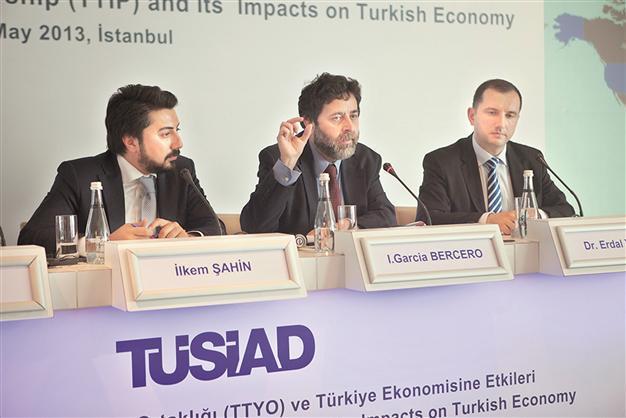EU ‘can’t force inclusion of Turkey in trade deal’
ISTANBUL - Hürriyet Daily News

The EU cannot force countries to negotiate free trade agreements with Turkey and can only encourage bilateral deals, says Garcia Bercero (C). Courtesy of TÜSİAD
The European Union “cannot force” countries to negotiate free trade agreements with Turkey and can only offer so much in light of bilateral agreements, the European Commission’s chief negotiator at the Transatlantic Trade and Investment Partnership (TTIP), Garcia Bercero, told the Hürriyet Daily News.Turkey’s firm belief in European backup in anticipation of the massive trade and investment agreement between the bloc and the United States has only a limited reality, Bercero said. “At the end of the day, what we can do is that we can talk to countries, we can explain to them why in light of the customs union it would certainly be appropriate for those negations to be conducted, but that’s the limit of what we can do.”
Several minutes before Bercero’s words, during a panel organized by the Turkish Industry and Business Association (TÜSİAD), the Turkish deputy undersecretary of the Ministry of Economy had stated clearly that Turkey did not call for “big brother protection” but rather “simple requirements of the EU’s responsibility in the customs union agreement.”
“Up to a limit, yes, we feel that we have a responsibility on the issue,” Bercero told the Daily News, “but at the same time, it’s not possible to simply pretend countries are going to start negotiations simply because we tell them that it would be the right thing to do.”
Deputy Undersecretary Cemalettin Damlacı complained about the customs union agreement earlier in the day, saying the arrangement was on the verge of losing its sustainability and “turning into a free trade agreement.”
Bercero, however, dismissed “a purely negative view of the customs union.”
“If Turkey now has a significant number of free trade agreements with countries, it has been in part because of the customs union. Those countries would not have negotiated with Turkey without the reality of the customs union,” Bercero said. Bercero added that both sides should overrule “ideas that are not realistic” and focus on “parallel negotiations instead of negotiations all together.”
US ‘values’ message
The process of concluding a free trade union in the EU is a longer process, with ratification taking up to two years, which would give Turkey enough time to hash out differences with the U.S., Bercero said.
“My strong recommendation would be for Turkey to start a working group with the U.S. as quickly as possible, to prepare well for the negotiations, and throughout this process we would be keeping Turkey well-informed on how the negotiations are proceeding,” Bercero said.
The panel hosted a series of significant figures from the Turkish economy ministry and business circles, with the deputy undersecretary repeating Turkey’s perseverance in “communicating to the highest levels and every platform,” defining the subject as “the most important point on the agenda with the U.S.”
Zafer Ali Yavan, secretary-general of TÜSİAD, added that business circles “would show great efforts to not let Turkey be excluded.”
Laird D. Treiber, the economic officer of the U.S. ambassador to Turkey, also attended the panel and said the message Turkey has been conveying regarding the TTIP had been received well and had been taken into consideration. “We heard the message and we value the message,” Treiber said. “I reassure you we understand the importance Turkey attaches to free trade agreements.”
















